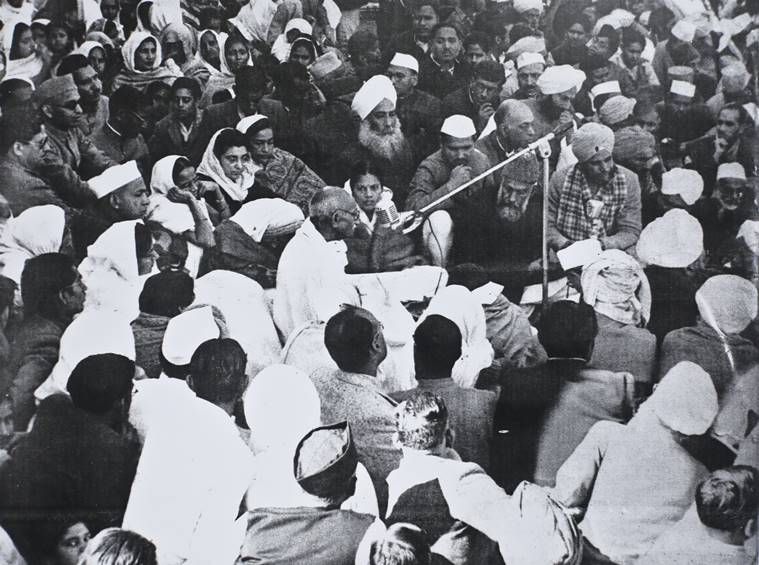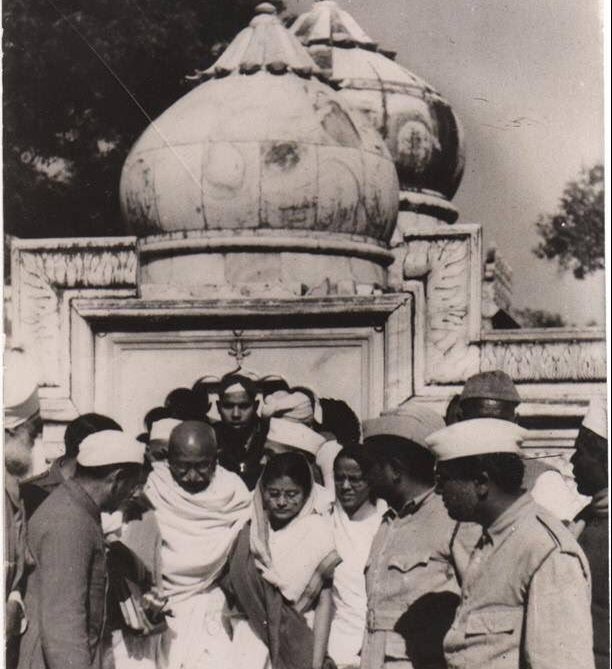GUJARAT / NEW DELHI :
Late Kushwant Singh’s account of the Mahatma’s last days, and pride in Indian Islam

Hyderabad (Rahnuma) :
India’s most celebrated writer and former Member of Parliament, the late Kushwant Singh wrote in his book, published as “Notes on The Great Indian Circus”; “ It should be remembered that Mahatma Gandhi who conducted daily prayers where he was, did not go into temples and the last time he went to a place of worship was at the tomb of Qutubuddin Bakhtiyar Kaki.”
Born in 1173 AD, Khwaja Qutub Uddin Bakhtiyar Kaki was the most renowned Sufi mystic, saint and scholar of the Chishti order in the Indian subcontinent.
His mausoleum was the first dargah of a prominent Muslim in Delhi. He was a disciple and the intellectual successor of Moinuddin Chishti of Ajmer as head of the Chishti order. Delhi’s Qutb Minar, is said to have been dedicated to him.
Qutbuddin Bakhtiyar Kaki had a tremendous influence on Islam in India. As he continued, and developed the traditional ideas of Monism (non-dualism, Wahdat ul-Wujud, Advaita Vedanta), universal brotherhood and generosity.
His dargah located adjacent to Zafar Mahal in Mehrauli is the oldest dargah in Delhi.
Three days before he was shot and martyred, on January 27th, 1948, Mahatma Gandhi held his last public address at the shrine of Muslim sage Qutbuddin Bakhtiyar Kaki in Mehrauli.
The Partition caused an eruption of violence in Delhi which was refusing to abate. Delhi was overflowing with refugees, and people were afraid to leave their homes. During the annual Urs held at the dargah, a tradition observed for centuries – there were only a few Muslims present to mark the occasion.
In this perilous circumstance, Mahatma Gandhi held a prayer meeting at the shrine of Qutbuddin Bakhtiyar Kaki.
In his other book, “The Novel”, Kushwant Singh described the incident in the following manner: “ Gandhi bows to Kaki’s Tomb. The Mussalmans accompanying him request to, utter our Fateha. So the Mahatma raises his hand and recites: In the name of Allah the beneficent and the merciful.”
According to Singh, it was here that Mahatma Gandhi met Maulana Jamal Miyan Firangi Mahali (the son of Maulana Abdul Bari Firangi Mahali, whom Gandhi referred to as his brother), who recounted the entire meet to an Urdu newspaper upon his return to the city of Lucknow.
“ Maulana Jamal asked Gandhi how he knew Hazrat Bakhtiyar Kaki to which the latter replied, it was in fact, his father Maulana Bari who had introduced him to the great Sufi saint as the disciple of Hazrat Moinuddin Chishti Gareeb Nawaz of Ajmer “ recalled Adnan Abdul Wali Firangi Mahali, the great-grandson of Moulana Bari, referring to the reported incident.
Explaining the incident further, Gandhi had told Jamal how he was invited by Moulana Bari from Ahmedabad to Ajmer, in March 1922, where the Mahatma had his first experience with sitting in an authentic Chisti Qawwali.
“ The Ghazal being sung was composed by Maulana Mohammad Ali Jauhar and the Bihar secretary of the Khilafat Committee, Dr. Syed Mahmood was translating it to Gandhiji from Urdu to English, ” said Adnan. In awe of what unfolded before him during the event, Mahatma Gandhi enquired from Moulana Bari about Moinuddin Chishti’s intellectual successor Bakhtiyar Kaki. The Mahatma was apprised cordially on the life of Bakhtiyar Kaki by Moulana Bari.
Later in the year 1948, when Mahatma Gandhi visited Bakhtiyar Kaki’s shrine, the annual Urs celebrations that had been called off owing to rampant rioting were reinstated.
Marking the occasion, the Sikh brethren had performed Qawwali at the shrine under Mahatma Gandhi’s guidance.
Mahatma Gandhi’s endeavor for peace and harmony was his last fast-unto-death, signaling the riots to cease.
With pressure mounting from all sections of society to call off his fast, he laid down five conditions, of which the return of Kaki’s shrine to Muslims and that it be repaired by Hindus and Sikhs together was one.

Rafi Adeen is a Contributing Editor for The Rahnuma Daily (TheRahnuma.com), the online English daily edition of The Rahnuma-E-Deccan Daily (ReDD), India’s oldest Urdu daily print newspaper. He can be contacted at rafi@therahnuma.com
source: http://www.therahnuma.com / The Rahnuma Daily / Home / by Rafi Adeen / November 13th, 2019








